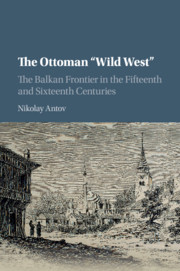The Ottoman 'Wild West' The Balkan Frontier in the Fifteenth and Sixteenth Centuries
Langue : Anglais
Auteur : Antov Nikolay

An analysis of Balkan Islam and the formation of one of the largest Muslim communities in the early-modern Ottoman Balkans.
In the late fifteenth century, the north-eastern Balkans were under-populated and under-institutionalized. Yet, by the end of the following century, the regions of Deliorman and Gerlovo were home to one of the largest Muslim populations in southeast Europe. Nikolay Antov sheds fresh light on the mechanics of Islamization along the Ottoman frontier, and presents an instructive case study of the 'indigenization' of Islam ? the process through which Islam, in its diverse doctrinal and socio-cultural manifestations, became part of a distinct regional landscape. Simultaneously, Antov uses a wide array of administrative, narrative-literary, and legal sources, exploring the perspectives of both the imperial center and regional actors in urban, rural, and nomadic settings, to trace the transformation of the Ottoman polity from a frontier principality into a centralized empire. Contributing to the further understanding of Balkan Islam, state formation and empire building, this unique text will appeal to those studying Ottoman, Balkan, and Islamic world history.
Introduction; 1. The broad historical context – the rise of the Ottoman empire and the formation of Muslim communities in the Balkans as an integral part of the Ottomanization of the region; 2. Colonization, settlement, and faith in the Balkans in the Early Ottoman period (ca. 1352 to early sixteenth century); 3. The northeastern Balkans from the late Medieval period to the late fifteenth century: pre-Ottoman Turcoman invasions and migrations, the Ottoman conquest, and the 'turbulent' fifteenth century. Deliorman and Gerlovo as a 'special case'; 4. The repopulation of Deliorman and Gerlovo's countryside in the sixteenth century; 5. The development of the urban network in sixteenth-century Deliorman. The emergence of Hezargrad and Eski Cuma, the transformation of Shumnu into an Islamic city, and the decline of Chernovi; 6. Religion, culture, and authority: two case studies; 7. Issues in religion, culture, and authority: conversion to Islam and confessionalization.
Nikolay Antov is Assistant Professor of History at the University of Arkansas. His research has been supported by the Social Science Research Council, the National Endowment for the Humanities, and the American Research Institute in Turkey. It focuses on the history of Islam and Muslim communities in the Balkans, the historical development of heterodox Muslim dervish groups in the Ottoman Empire and the wider Islamic world, conversion to Islam, and the relations between Muslims and non-Muslims.
Date de parution : 03-2020
Ouvrage de 344 p.
15x23 cm
Date de parution : 12-2017
Ouvrage de 342 p.
15.6x23.5 cm
Thème de The Ottoman 'Wild West' :
© 2024 LAVOISIER S.A.S.



